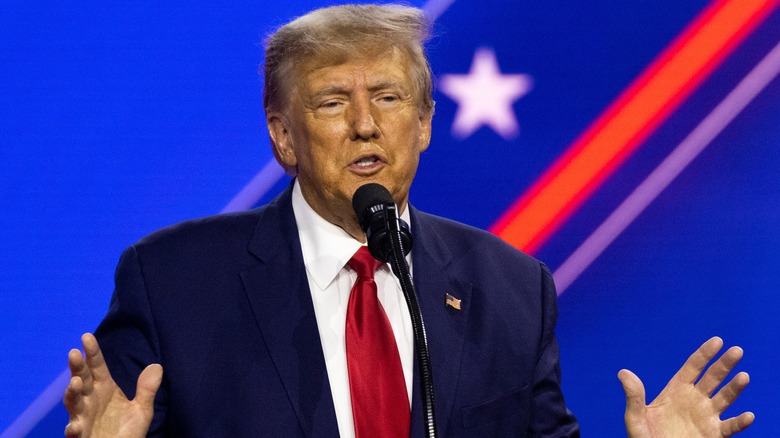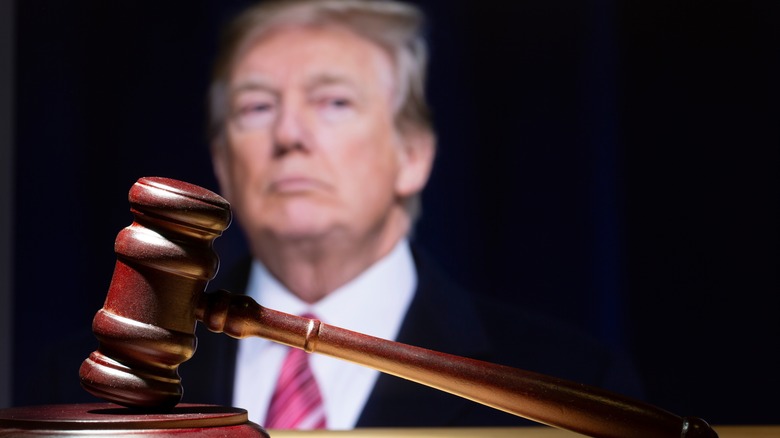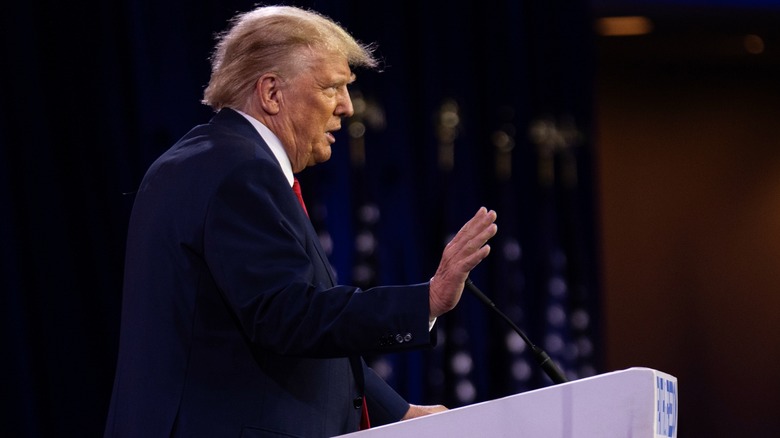Former Prosecutor Tells Us Why Donald Trump Shouldn't Sweat Colorado's Ballot Shocker
Former president Donald Trump may have led in the polls to be the Republican candidate for president as of December 2023, but Trump's 2024 campaign has taken a hit with the 4-3 ruling by the Colorado Supreme Court that bars him from being on the state's 2024 presidential primary ballot. In the 213-page opinion, it was deemed that Section Three of the 14th Amendment did, in fact, apply to the office of the presidency — which was a reversal of a previous lower Colorado court ruling — and that Trump, having incited the January 6, 2021 attack on the U.S. Capitol, had engaged in insurrection.
As a quick primer for those not versed in that particular section of the Constitution: It was put in place after the Civil War, and it says that you can't hold office if you "have engaged in insurrection or rebellion against the [Constitution.]" It names specific offices, like senator and representative, but it doesn't specifically name the president, though it does include the phrase "any office, civil or military under the United States."
But it may be that the ruling won't have much of an impact. The List spoke with former federal prosecutor Neama Rahmani, president of West Coast Trial Lawyers, to get his take on what happened and how it may impact Trump's campaign and chances at another term as president. "The Colorado Supreme Court's ruling will likely be overturned," Rahmani said, "even though Trump did engage in an insurrection."
Donald Trump's team has plenty to appeal
First, there will almost certainly be an appeal of the ruling by Donald Trump's lawyers. "Trump has many arguments on appeal," Neama Rahmani explained. "Trump hasn't been charged, much less convicted, of insurrection. The claim may be premature because Trump isn't officially the Republican candidate or the Colorado court's definition of insurrection may have been too broad."
The possibility of the 14th Amendment to keep Trump off the primary ballot has already been ruled on in other states. In August 2023, a Florida judge dismissed a lawsuit that would have looked at whether Trump could be on the ballot there. In November 2023, courts in both Michigan and Minnesota said that even if disqualification under the 14th Amendment did apply to Trump — they didn't confirm nor deny that it would — it wouldn't apply to being named on the primary ballot. As of December 2023, 13 other states have pending lawsuits related to Trump's eligibility for president under Section 3, and court decisions were under appeal in two more.
As far as continuing to try to get Trump removed from the ballot through lawsuits, Rahmani doesn't seem to think that's necessarily the best way forward. "Democrats are going to have to [...] face the political reality that disqualifying the leading Republican candidate for legal reasons may be bad public policy." Trump, via Truth Social, has called the situation "ELECTION INTERFERENCE!" — a perspective with which some may agree.
The Supreme Court may get involved in the case
Never before has a state Supreme Court made such a ruling, and Neama Rahmani thinks there's a reason it happened in Colorado. "Colorado is the best venue for the 14th Amendment litigants because the Colorado Secretary of State has an affirmative duty to disqualify constitutionally prohibited candidates and the Colorado Supreme Court justices were all Democrat-governor appointees," Rahmani said. The appeal of the Colorado Supreme Court decision may be taken up by the U.S. Supreme Court, where "six out of nine justices were appointed by Republicans," Rahmani pointed out, and three of those six Republican-appointed justices were appointed by Trump himself during his term as president.
January 5, 2024, is the deadline for the Supreme Court to decide if it will hear the case. If they do hear it, they may deem that the rulings of the other states are more in line with the law than the ruling in Colorado.
However, even with that potential Supreme Court decision, it may not be the last word on the 14th Amendment and Trump for a couple of reasons. First, the current rulings are related to Trump's name on the primary ballot and not the general election ballot. Second, the trial on the federal charges against Trump in relation to the January 6 insurrection starts on March 4, 2024, and a conviction against Trump could change if or how the 14th Amendment applies to him if he is in the general election.


